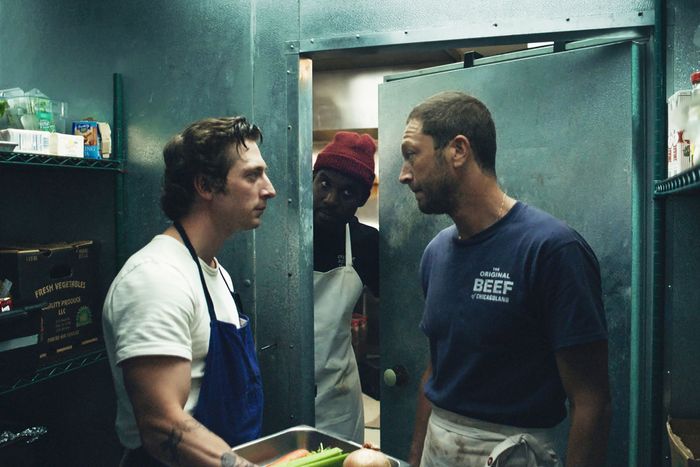
In the first episode of The Bear, the young and ambitious Sydney Adamu (Ayo Edebiri) walks into an old-school Chicago sandwich joint, applies for a job, and immediately gets thrown into the fray of a bustling kitchen. Carmen “Carmy” Berzatto (Jeremy Allen White), who recently inherited the Original Beef of Chicagoland from his late brother, Michael, has work for her to do. Because there is always work to do, always food to prep, always a sauce that needs stirring, always a mess to clean up, always something until it’s time to clock out, get some sleep, then come back and reenter the fray.
Watching The Bear, an FX production that streams exclusively on Hulu starting today, is like being Sydney on her first day. You immediately get dropped onto a spinning culinary carousel and have to find your equilibrium on your own. Under the stewardship of series creator Christopher Storer, who wrote or co-wrote four of the eight episodes and directed five, The Bear does not bother to explain its restaurant lingo, immediately lay out character backstories, or even establish itself firmly as a comedy or drama. (Note: It’s both.) There is no time. You want exposition? Go watch Stranger Things so you can have the Upside Down explained to you for the fifth time. Dinner service starts in 20 minutes, and Carmy and his co-workers have sandwiches to make. If you need your hand held, just put your right one in your left one and keep it moving.
“All things go, all things go,” warbles Sufjan Stevens in “Chicago,” one of many choice needle drops in The Bear and also its operating principle. This show is all forward momentum and kinetic energy: subways in motion, gas burners lighting, shouting and noise and rushing, forever rushing to the next thing that has to get done. Famous Chicagoan Ferris Bueller said that life moves pretty fast, and that’s exactly what it does in The Bear, minus the part where you get to stop and look around so you don’t miss it.
Actually, the series does honor the latter part of that credo, if only for seconds at a time. Storer and his fellow director Joanna Calo will briefly pause to zero in on hyperspecific details in the Original Beef kitchen — carrots being julienned, juices oozing off a roasted chicken, the wall clock that reminds everyone minutes are constantly being seized or wasted. Even those pauses carry weight and, thanks to the rapid-fire editing, add to a sense of stress and pressure that is as palpable here as the taste of all that food, glorious food. (I can’t stress this enough: Make a snack, if not a full meal, before you sit down to binge this show.)
Carmy, once a high-end chef at the French Laundry and Noma who’s now overseeing the slapping of grilled onions, peppers, and braised meat onto homemade rolls, writes the phrase “sense of urgency” on a piece of tape and sticks it to one of the countertops. It’s what he asks for from his staff as he implements the brigade system for maximum efficiency and urges them to communicate more clearly — “Thank you, chef” becomes the catchphrase of the kitchen. It’s also what animates all of the principal characters, who are flawed, lovable, and fully, blessedly human.
Carmy, played with deliberate and effective reserve by White in his first leading television role, is urgently trying to understand how his brother was running — or failing to run — his business. (Michael’s filing system can best be described as unbridled chaos. Some important documents needed by Carmy and his sister, Sugar, played by Abby Elliott, are eventually found in a paper folder labeled, simply, “Shit.”) Richie (Ebon Moss-Bachrach) is a mouthy wild card who can’t figure out how he fits into the restaurant or the world in general now that Michael, his best friend and employer, is dead. Moss-Bachrach finds the soft heart that beats underneath Richie’s resentment toward Carmy, the kid he still calls “cousin” but who is now running things.
Sydney, who has a spine as strong as her many ideas for improving the restaurant, is incredibly skilled and impatient for those skills to be rewarded. Edebiri, the comedian and voice of Missy on Big Mouth, plays her with welcome confidence instead of the insecurity that often becomes the defining quality in mentee-type characters. And Marcus (an absolutely charming Lionel Boyce), the Original Beef’s inquisitive pastry chef, is fixated on figuring out how to craft the perfect doughnut; episode four opens with a doughnut-making sequence that is easily the most sensuous thing I’ve seen on television in the past year, and yes, I did watch Bridgerton season two in its entirety.
Everyone on The Bear is trying to get on their game and still getting blindsided by the unexpected. They shout “Corner!” every time they turn one in the kitchen because they never know who might be just on the other side, unwittingly about to slam into them. That’s the nature of working in a tight, extremely busy work area and the nature of how things go in this series, where there’s always another fire to put out, and sometimes that fire is a literal fire.
“Corner!” Hey, here’s an unexpected visit from the health inspector.
“Corner!” Okay, who took the onions I need to prep?
“Corner!” Oh, look, a toilet just exploded.
“Corner!” Literally everything that happens in the exemplary seventh episode, a 20-minute knockout that depicts crisis after crisis in what seems to be largely a single take.
Everyone on The Bear must always brace for the unexpected, and that is what makes this series so instantly compelling, tense, and beautiful all at once. These eight episodes may leave you breathless and a little dizzy. But when it’s over, prepare to say, “Thank you, chef.”


